Operating Model Reverse Engineering (OMRE)
Overview
The main purpose of the OMRE
- Audit trail of the all Operating Model objects
- Change management of the Operating Model
- Additional functionality that will bring more flexibility in the management of the Operating Model
Possible use case scenarios
- Explore Operating Model objects as regular assets and relations without Admin role
- View various diagrams to help understand the model with all asset types and (complex) relation types between them (it will help during the design of the custom asset model)
- Find all dependencies between objects to assess the impact of the changes, e.g.: which Operating Model objects will be impacted in case of attribute type removing
- Check which asset types are using particular attribute type before changing its description or number of possible values
- See who and when created/changed the Operating model object
- See how many objects have been created/updated/deleted since your last OMRE export
- Propose changes to the existing Operating Model objects (e.g. description of the attribute type) review, approve and implement them through the workflow
- Find which users or user groups are assigned to a given role
- Find some gaps and mistakes in the Operating Model – unused objects, empty domains, overlapping scopes etc.
- Check how existing asset types are governed by showing all workflows which are assigned to the particular asset type
Media
More details
Release Notes
Performance Enhancements:
- Improved overall performance and reduced runtime
Bug Fixes:
- Addressed and resolved various bugs
Validation in Start Workflow:
- The start workflow now validates the operating model.
- If any required elements for the extract workflow are missing, the start
workflow will throw an exception and halt execution, preventing
progression to the extract workflow.
Changes to Start Form:
- The count option has been removed; it is now included by default.
- The operating model is validated by default.
- Users and groups are now optional.
- New parameters can be set up (Target Community, Import Finalization
Strategy, Simulation, Users Limit value and Delay Duration)
Streamlined Extract Workflow:
- The extract workflow no longer includes a user task.
- Upon completion, the summary is added as a comment.
- The initiating user is notified of the results via email.
- The import file is uploaded as attachment (in the target community) in case
of import failure to facilitate begugging.
Changes to BPMN Source Files:
- Significant reduction in file size for the extract workflow.
- Previously: 5,529 lines in BPMN, Now: 1,498 lines in BPMN
Compatibility
- Collibra Data Intelligence On-Prem
- Collibra Data Intelligence Cloud
Dependency
- Java Runtime Environment 8
- Collibra API v2
License and Usage Requirements
Release History
Version 1.2.1
March 28, 2025
Release Notes
- The new version of ScopeApi returns an Immutable List. This version includes a fix on the workflow casting the Immutable List to Arraylist to fix the issue
- There are no changes to the Operating Model and Asset Model
Compatibility
- Collibra Data Intelligence On-Prem
Dependency
- Java Runtime Environment 8
- Collibra API v2
License and Usage Requirements
Version 1.2.0
March 28, 2025
Release Notes
- fixed minor bugs
- in the past if there was a custom asset created in one of the domains in the Operating Model community and if this asset didn’t have UUID attribute type the OMRE workflow could fail in the middle of the extraction process. Starting from v1.1.2 OMRE process will be checking such assets in the beginning of the execution and will be stopped immediately
- the new attribute type “Sequence Number” has been added to the Complex Relation Type “Assignment Characteristics” so now it’s possible to control changes in the position of the assignment’s characteristics
Compatibility
- Collibra Data Intelligence On-Prem
Dependency
- Java Runtime Environment 8
- Collibra API v2
License and Usage Requirements
Version 1.1.2
March 28, 2025
Release Notes
- fixed bug with updated Compex Relations
Compatibility
- Collibra Data Intelligence On-Prem
- Collibra Data Intelligence Cloud
Dependency
- Java Runtime Environment 8
- Collibra API v2
License and Usage Requirements
Version 1.1.1
March 28, 2025
Release Notes
- fixed bug with disabled workflows which have been extracted twice
- added counters which will be shown in the log-file during the Operating Model extraction and will make this process more transparent
- information about who started the workflow will be added to the report, as well as the start time and end time of the extraction
- the final report with information about how many assets have been extracted/updated/deleted as well as who and when was extracting the Operating Model will be added to the comments of the Operating Model community
Compatibility
- Collibra Data Intelligence Cloud
- Collibra Data Intelligence On-Prem
Dependency
- Collibra API v2
- Java Runtime Environment 8
License and Usage Requirements
Version 1.0.8
March 28, 2025
Release Notes
Bug fixing
Compatibility
- Collibra Data Intelligence Cloud
- Collibra Data Intelligence On-Prem
Dependency
- Collibra API v2
License and Usage Requirements
Version 1.0.7
March 28, 2025
Release Notes
- System and hidden Operating Model objects added to the extraction
- The approach to counting assets is changed and now takes 10x less time
Compatibility
- Collibra Data Intelligence Cloud
- Collibra Data Intelligence On-Prem
Dependency
- Collibra API v2
License and Usage Requirements
Version 1.0.6
March 28, 2025
Release Notes
Fixed bug when disabled users treated as the removed one.
Compatibility
- Co
- Collibra Data Intelligence Cloud
- Collibra Data Intelligence On-Prem
Dependency
- Collibra API v2
License and Usage Requirements
Version 1.0.5
March 28, 2025
Release Notes
Release notes:
Checked compatibility with DGC v5.7.5
Compatibility
- Collibra Data Intelligence Cloud
- Collibra Data Intelligence On-Prem
Dependency
- Collibra API v2
License and Usage Requirements
Version 1.0.2
March 28, 2025
Release Notes
- What does OMRE contain?
- Custom model extensions (asset types, relation types etc) that allow capturing your asset model as instance data
- A root community ‘Operating Model’ with 13 domains
- Views (diagram views, asset table views, saved searches etc) to navigate the model-as-instance-data
- Workflows which extract operating model resources and create them as DGC Assets
- Workflow which demonstrates Operating Model change management possibility
- Example of the validation rule which demonstrates how easy you can find the gaps in the Operating Model using OMRE and Collibra features
Compatibility
- Collibra Data Intelligence Cloud
- Collibra Data Intelligence On-Prem
Dependency
- Collibra API v2
License and Usage Requirements
See existing Q&A in the Collibra Community
Browse discussions with customers who also use this app.
Start a New Topic in the Collibra Community
Collibra-hosted discussions will connect you to other customers who use this app.
Free

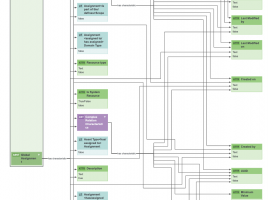
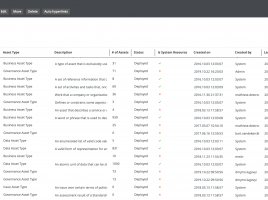
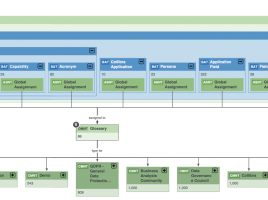
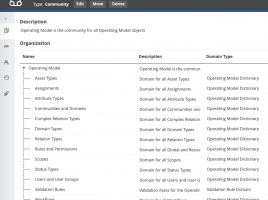
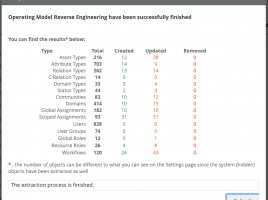









Shivam Sharma
Seems like this would be very helpful for our goal to establish collibra model change managment. However, have a couple of queries:
1. Is this compatible with Collibra 2021.02.1?
2. Additionally, the full cma simulation report highlights 3 changed resources: 1 resource type (change – allowed values) and 2 views:attestable (change – config for both views). Want to understand what the impact of the view change would be?
Marketplace Collibra
AdminHi Shivam,
Please post your question on our Data Citizen forum, where the community will be able to help you:
https://datacitizens.collibra.com/forum/t/omre-operating-model-reverse-engineering/501
Maarten Rahier (Datashift)
Great workflow, full overview of the operating model in Collibra!
Marketplace Collibra
AdminThanks Maarten
Peter.Vennel (Equifax)
I am getting this error when trying to run the worflow from .
“The workflow could not be started. No enabled users were found for role ‘Business Steward’,role ‘Subject Matter Expert’.”
I have users assigned to this and both of them are also Community Managers for “Operating Model”.
Marketplace Collibra
AdminWhich workflow are you trying to start? If it’s about “OMRE – Description Update” then you’re right, you have to have somebody assigned on this resource with ‘Business Steward’ and ‘Subject Matter Expert’ roles.
Archana Rajendra (American Express)
Workflow runs almost 1/2 hour and then fails with error “java.util.NoSuchElementException: Cannot access first() element from an empty List” . Is this known issue?